BAD EDUCATION (2019)
The beloved superintendent of New York's Roslyn school district and his staff, friends, and relatives, become the prime suspects in the unfolding of the single largest public school embezzlement scandal in US history.
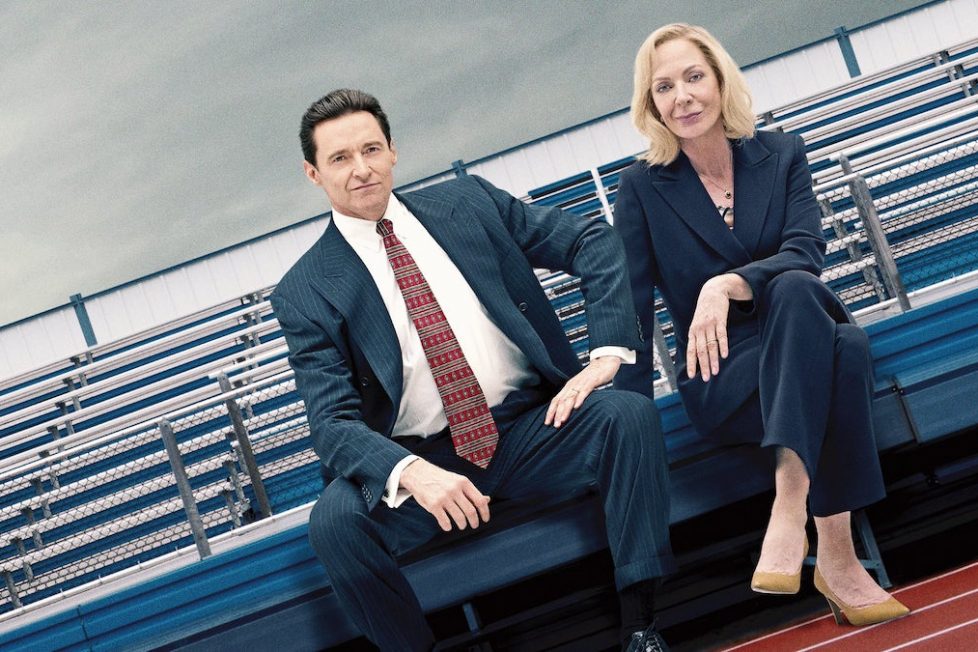
The beloved superintendent of New York's Roslyn school district and his staff, friends, and relatives, become the prime suspects in the unfolding of the single largest public school embezzlement scandal in US history.


Do you remember sitting on the bleachers in high school? Maybe it was to gossip about a crush, or have lunch, or maybe you were underneath smoking a joint. It’s fair to say you can’t finish school without some time spent on bleachers…. and neither can school administrators. It’s a great scene in Bad Education when superintendent Frank Tassone (Hugh Jackman) and his colleague Pam Gluckin (Alison Janney), mimicking student behaviour, sit eating lunch on the bleachers, showing concern about their body image and the need for a diet. It’s the first indication that image is everything in director Colin Finley’s new movie.
Like Tassone’s facelift, Bad Education looks great: the familiar presence of motivational posters, the reassurance of sympathetic teachers, and the luxurious mansions of Watford, Long Island. Being this perfect, who wouldn’t want to keep funding their school to makes it number one in the district?
Image is a familiar theme from my own experience of high school. Kids are constantly trying to keep up with trends and establish their personal identity. Based on the largest real-life school embezzlement scandal of 2003, Gluckin and Tassone stole nearly $11M from their district school board, only to be uncovered by their own school newspaper. It encapsulates the comforting predictability of student life and the unpredictable downfalls of adulthood.
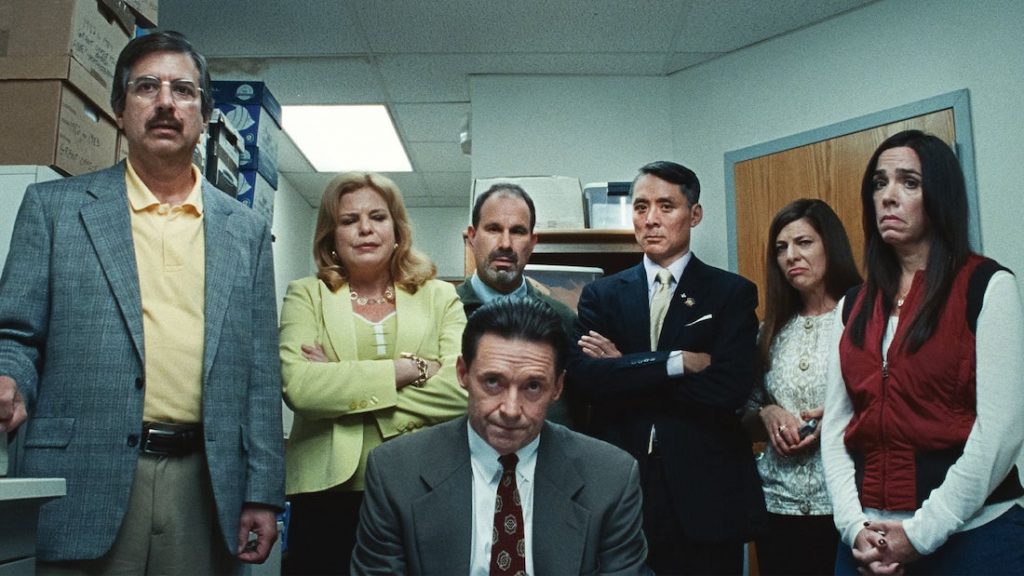
Whether through fleeting moments in HBO’s Veep or with her ‘Supporting Actress’ Academy Award win for I, Tonya (2017), Janney has made a name for herself in Hollywood, and Bad Education continues her trend of finding roles perfectly suited to her abilities. She makes Pam Gluckin her own right down to an excellent Long Island accent. Jackman also continues his record of stellar performances post-Wolverine, and playing Tassone is a career-best. Both actors vanish into their roles and seeing their incredible range isn’t to be missed.
Films often forgo a male-female friendship in lieu of romance, but in Bad Education, the friendship is emphasized and feels ironically honest. The two often parallel the behaviour of students, like on the bleachers, or when they stay behind to work after-hours—reminiscent of a late-night study session, but reviewing their school community, not algebra.
Tassone’s sexuality is another provocative look at how far people will go to protect their image, even if it means locking down a part of themselves, as some people experiencing atypical sexual identities in high school do. Tassone made sure to always wear the wedding ring of his deceased wife, someone I’m still not sure really existed. This earned him the sympathy of flirtatious single moms at his book club and kept up the facade of his heterosexuality. It’s interesting that the moms try to sleep with him as a way to advance their kid’s progress. Is it any better than Tassone writing off a few expenses over the years? The difference is the moms aren’t breaking the law, but they’ll be the ones who come down hard on Tassone as if their moral compass is better.
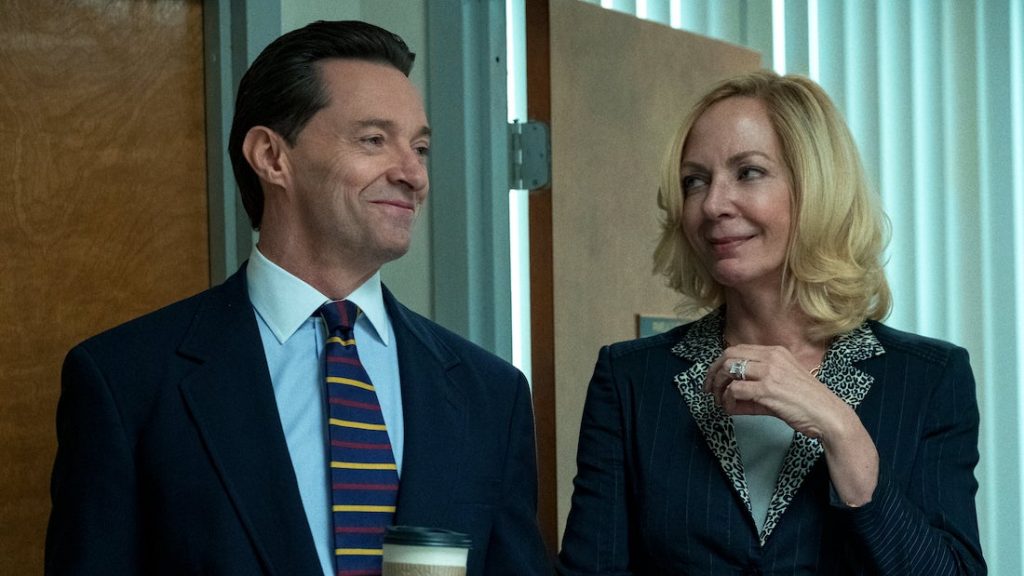
Tassone clearly cares for his career and his students, knowing them all by name along with their hobbies and talents. In more than one instance he recalls students from his past and their defining attributes. He cares so much he becomes resentful watching them move forward in life, helping them get into the IVYs of their choice year after year while he stays in the same monotonous routine, a thought previously observed by Reese Witherspoon’s character in Alexander Payne’s Election (1999). For Tassone, that’s what education had become: parents obsessing over their children going to the best schools, in the best districts, and getting into the best universities. But they never remember the people who got them there. For the record, I do remember the teacher who taught me To Kill a Mockingbird, contrary to what Tassone says, and I’d readily call her up to share my experiences with her—the contrast being she wouldn’t care. It’s further evidence that Tassone really does love his students and his job.
Tassone and Gluckin exploit people’s obsession with image, to continue receiving funding from the school board, the same way they feel exploited. He expresses having a problem with parents “treating us like low-level service reps,” in one heated monologue that’s so well executed it’s a highlight of Jackman’s career (And I’ll never hear the word ‘accelerated’ the same way again.) They use school accounts for personal luxuries, like property renovations and PlayStation consoles, and come up with fake expense reports for a SkyWalk (a path that would connect each end of the school) because it’s not just about having the best teachers and the best education, you need the best look. They project a perfect image to keep pocketing money from people who believe money will get them the best standard.
Bad Education fails in being a true-crime picture when it succeeds at pulling on your heartstrings. It isn’t just a crime story, it’s about life unravelling and slipping through your fingers. When the malicious intent of Gluckin and Tassone is exposed, so are some of their deepest secrets. No matter what Tassone tries to do, he’s backed into a corner. He can’t outrun the law. It all started so simply with an accidental purchase of a pizza and Coke on the school card. How did it become millions? I’m not convinced even Tassone was aware of the monstrously illegal implications his theft had.
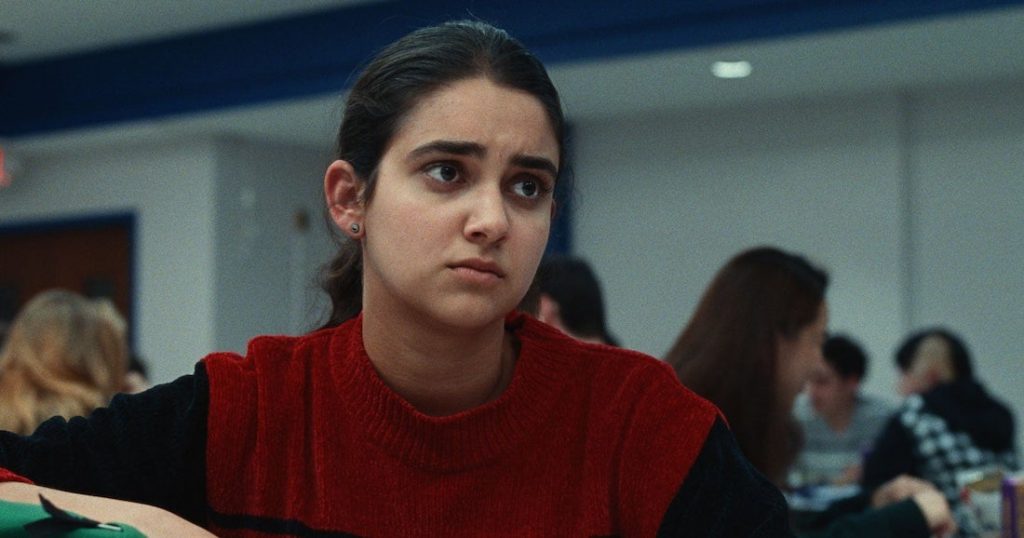
Director Baz Lerman’s Great Gatsby (2013) adaptation, based on a staple of high school literature (coincidentally also set on Long Island) was romanticized with star power and a modern-day familiarity (like a soundtrack featuring pop icon Lana Del Rey) to shock us because this generation is harder to shock. Similarly, Gluckin and Tassone haven’t committed murder, nor are they the bizarre niche Tiger King explored, the kind of content you might expect to keep you hooked in a film marketed as true crime. If it wasn’t Janney and Jackman with their unique looks and talent (you’ll notice a stark difference between their dignified expressions and the real-life administrators), the plot would fall flat for a theatrical feature. Their performances and some clever storytelling angles tie this film together and make for a thrilling on-screen depiction of an administrative embezzlement scheme.
Janny portrays Gluckin with such authenticity that, barring her criminal intent, the film offers a peek into the lives and attitudes of administrators you’ll recognize from your own school. I’m confident that Gluckin and Tassone, or at least Janney and Jackman’s version, started off with good intentions. Still, there is a shallowness to them. “I have DEGREES!” Gluckin insists, believing this makes her better than others (even her family) and is a reason for why she can’t work in sales. She’s above it. After all, it might damage her image now she’s all but a celebrity in her Long Island community.
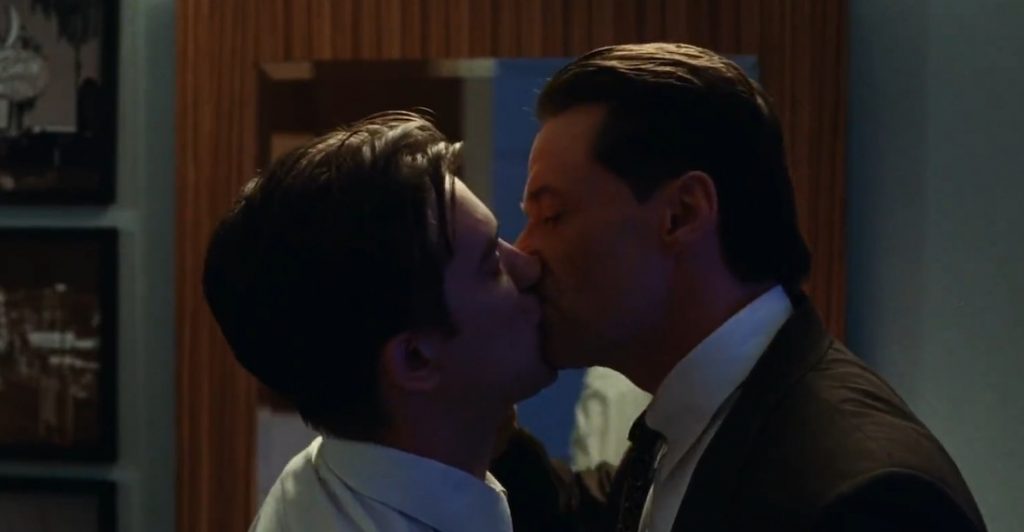
The student reporter in the film, Rachel Bhargave (Geraldine Viswanathan), plays her role with an objective attitude. She’s warily certain that what she is exposing is right but might not be what’s best for her future. Will she still get into an Ivy League university? Is this story worth ruining people’s lives, especially the people that helped her? It’s a moral conundrum that plagues journalism. Rachel’s a true reporter in the making and, sadly, her character is created for the sake of the movie. It’s a good inclusion on behalf of writer Mike Makowsky (who actually went to the school this theft occurred) that helps us see a different viewpoint. Her character offers several tense moments when the story twists and develops from her perspective helping the plot feel engaging and thrilling. Although the student paper did expose Tassone and Gluckin, it wasn’t the work of just one student and it was after many other papers in the area had already started reporting on the missing funds.
At a time when most businesses are closed and new cinemas releases are on hold, Bad Education is a necessary reminder of the importance of straight-to-DVD and video-on-demand, releases. A film doesn’t need a big budget, red carpet fanfare, or opening weekend outings to showcase its talent and tell a meaningful tale. I hope this is a reminder not to write off a film that doesn’t get a cinematic premiere.
This production generates new life in an underrated part of the industry. It’s also a great showcase for crime stories that aren’t as extreme as the disappearance of Madeleine McCann or the heinous acts of Carole Baskin. Instead, Bad Education examines interesting aspects of human behaviour and temptation, as well as character studies in the field of education. What’s on the surface is rarely true of what lies underneath and people should be more concerned with their inner workings rather than the trimming of their nose hairs like Tassone.
USA | 2019 | 108 MINUTES | 2.39:1 | COLOUR | ENGLISH

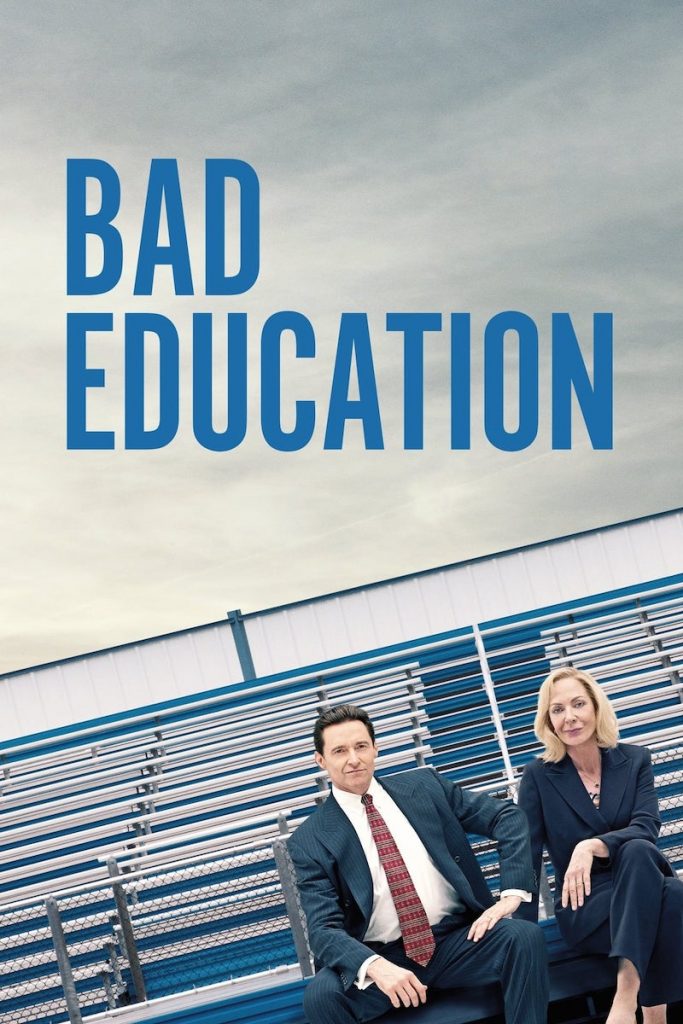
director: Cory Finley.
writer: Mike Makowsky (based on the book ‘The Bad Superintendent’ by Robert Kolker).
starring: Hugh Jackman, Allison Janney, Geraldine Viswanathan, Alex Wolff, Rafael Casal, Stephen Spinella, Annaleigh Ashford & Ray Romano.
